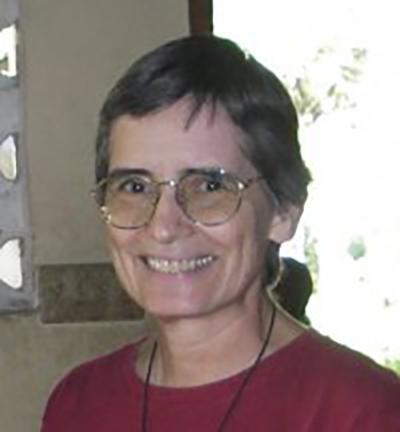
My sense that God was calling me to the msns began when I was in 1st grade. We were reading a Holy Childhood magazine about the ‘pagan babies’ in China. When we finished, I knew that God was calling me to be a missionary in Africa. It was a conviction that never left me. When, as a senior in high school, I spoke to Rev Mer Barry about entering the Society, I told her this. Her response was simply, “If God wants you to go to the missions, he’ll send you.” Studying for a doctorate in anthropology, I chose to do my fieldwork in Africa. When my plane landed in Accra, Ghana, I had an overwhelming feeling of coming home. I was alone; the nearest RSCJ were in Zaire, and everything operated according to different rules. Life in my forest village was full of surprises, and I kept encountering things which made no sense at all! Gradually, though, as the months went by, I learned how to behave appropriately at funerals and festivals, with chiefs and traditional priests. My language skills improved, and my thinking began to travel within new paradigms. I felt at ease.
After a year, I took a two week vacation with our Sisters in Zaire. I had learned to speak Twi; they spoke French. I was wearing a little cotton dress; they were still wearing the habit. The food was different from what we ate in Ghana. Even the fufu was different. But I was welcomed with open arms, the things I feared might be obstacles were topics of interest rather than rejection. We were all RSCJ; we were one. That was a powerful confirmation of my vocation.
Soon after my arrival, I asked the people to correct me when I did or said something wrong or made a mistake, because that was how I would learn. One morning, I greeted a group sitting along the side of the road, and they all started shouting at me. What was wrong? I was sure I had used the right greeting. Finally, I understood that I was to go over to them and shake hands with each one, starting from the right and going to the left. When I did it, they all cheered. But the next morning they gathered outside my door, carrying bananas, pineapples, avocados, and other gifts. Why? They’d come to apologize for correcting me the day before. They knew white people don’t like to be corrected. After I explained that that was what I hoped they would do, there was no end to the corrections I received! I was there to learn, not to take over.
How was I a missionary? I was in Ghana to do research, and was not ostensibly preaching Jesus, but everyone in the village knew I was a nun. I was trying to live as a follower of Jesus, with humility, respect, honesty, and a caring presence, and people watched and commented on how my behavior matched their expectations. When the traditional priest made me a gift of some eggs, there was much discussion as to whether I could eat them. Hadn’t they been sacrificed to idols?
I think that was my way of being a missionary – to learn, to show I cared about them by my example, my questions, and my efforts to understand their rituals and customs. I tried to understand and respect their culture; I questioned practices that seemed harmful to certain groups, especially the poor, the elderly, children, and women. I didn’t try to change them so much as to let Jesus be present to them through me. Jesus was definitely present to me through them. I made many mistakes, but I learned a lot from them about being Christian. Some things I only understood after I had left. Years later, in other cultures – Kenya, Uganda, and Haiti, the contexts were very different, but my approach was basically the same. What would I suggest to others who want to go to the missions?
- Ask yourself what your motivation is. When you take it to prayer, are you at peace? What is at the heart of your call?
- Learn as much as you can about the country: its history and culture; the history of the Church there, and current issues facing it; the place of the Society in the country and in the locale where you’ll be living; the present political situation and the risks and dangers you might be facing. Talk to different people who have lived there; read novels based there. What work will you be doing? What do you hope to give? What do you hope to receive?
- Do you speak the language? If you’re going for a short time and the people speak English, you may not have to worry about that, but if they live their daily lives in a language other than English, it’s important to know something about it. Language has a political significance; it ranks one as more or less respected in the national hierarchy. It’s a sign of respect to know the common greetings in a person’s language. If you’ll be there for a long period, it’s important to learn to speak it. It may take years to speak it well, but language is the bearer of a culture’s values and ways of thinking that often cannot be translated. That knowledge can be key for you.
- Your health. What access will you have to the things you need to stay healthy? Will you have access to what you need for your spiritual and psychological health?
- Judy Vollbrecht, rscj
